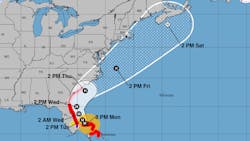Transit systems in Florida, Georgia and South Carolina prepping for Hurricane Dorian
Transit providers up and down the south eastern coast of the United States have activated emergency plans, suspended service and are using their fleets to help with the evacuation effort as the effects of Hurricane Dorian are expected to be felt through mid-week.
Amtrak cancelled trains servicing the southeast Florida through Thursday, Sept. 3 and is modifying other routes that serve Georgia. The railroad said service restoration would be dependent on improved weather conditions.
Brightline suspended service on Sept. 2. and said all Brightline stations, including West Palm Beach, Fort Lauderdale and Virgin MiamiCentral, would close until train service resumes.
SunRail posted an update Aug. 30 that it would not run Sept. 2 to Sept. 6 due to Hurricane Dorian and provided an update on Twitter Sept. 1 that said it was monitoring the storm and will resume service as soon as possible.
The South Florida Regional Transportation Authority (SFRTA) halted Tri-Rail service after the last train, Sunday, Sept. 1, 2019, and will not resume running until further notice. SFRTA explained hurricane winds were expected to cause damage to the rail corridor, especially in the northern part of the corridor located in Palm Beach County. The authority secured crossing gates on the corridor in preparation for the storm.
“We will work as quickly as we can after the storm passes to restore service and have everything back up and running,” said SFRTA Executive Director Steven L. Abrams. “We won’t know when service will be back up just yet, but all our efforts will be focused on getting trains running to help with potential recovery efforts after the storm.”
Further up the coast, Jacksonville Transportation Authority (JTA) planned to suspend all transit services on Tuesday, Sept. 3 at 1 p.m., including all fixed routes, First Coast Flyer BRT lines and the Skyway, in advance of potential impacts of Hurricane Dorian.
JTA’s Connexion paratransit service will only perform life-sustaining and evacuation trips. The authority had evacuation shuttles active Monday evening until 8 p.m. with service expected to resume Tuesday morning and continue for as long as conditions were safe to operate. The JTA’s St. Johns River Ferry was relocated from Mayport Village on Monday and will remain closed until further notice.
Chatham Area Transit (CAT) in Savannah, Ga., began assisting with the mandatory evacuations activated by the storm and will begin waving fares at 8 a.m. on Tuesday to begin transporting residents without private transportation to the Savannah Civic Center. At the Civic Center, residents will be able to board free charter buses to travel to inland shelters.
“The buses are meant to help get residents and visitors out of harm’s way,” said interim Executive Director/CEO Michael Brown. “We encourage those who do not have their own form of transportation to take advantage of the service.”
Charleston Area Regional Transportation Authority (CARTA) suspended regular service on Sept. 2 at 8 p.m. until further notice. CARTA ran its Hurricane Evacuation Peninsula Circulator on Sept. 2 and will start the service between 8 a.m. and 7 p.m. on Sept. 3. The evacuation circulator provides pickups at 14 downtown stops with blue Hurricane Evacuation signs.
The slow-moving storm has been downgraded from a Category 5 to a Category 3 hurricane and its projected path, updated Monday afternoon, shows the main part of the storm will likely steer clear of most of South Florida, except for coastal areas. However, its cone of uncertainty still puts areas such as South Florida at risk of hurricane force winds, heavy rains and storm surges.
If you are in the path of the storm, please make sure you are prepared.
About the Author

Mischa Wanek-Libman
Group Editorial Director
Mischa Wanek-Libman is director of communications with Transdev North America. She has more than 20 years of experience working in the transportation industry covering construction projects, engineering challenges, transit and rail operations and best practices.
Wanek-Libman has held top editorial positions at freight rail and public transportation business-to-business publications including as editor-in-chief and editorial director of Mass Transit from 2018-2024. She has been recognized for editorial excellence through her individual work, as well as for collaborative content.
She is an active member of the American Public Transportation Association's Marketing and Communications Committee and served 14 years as a Board Observer on the National Railroad Construction and Maintenance Association (NRC) Board of Directors.
She is a graduate of Drake University in Des Moines, Iowa, where she earned a Bachelor of Arts degree in Journalism and Mass Communication.
